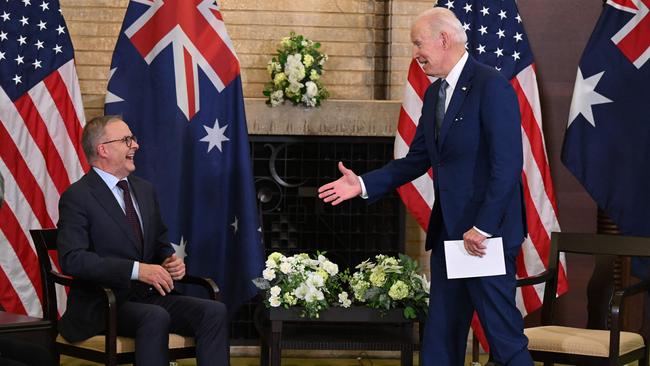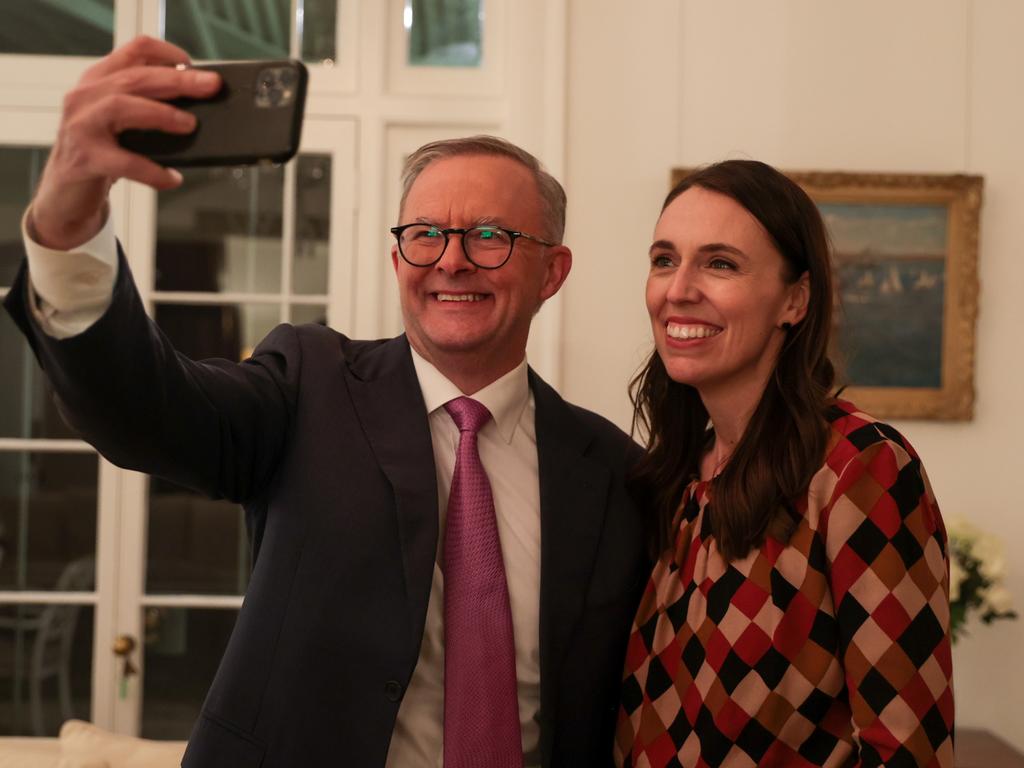Height, width and depth of a balanced foreign policy

Height refers to our long-standing strategic instinct to make common cause with a like-minded global ally, the US. Width involves participating in the activities of international institutions. Depth means building the strongest possible relations with the countries around us, in Asia and the Pacific.
Prime Minister Anthony Albanese sees the US alliance as “a central pillar of our foreign policy” and he got off to a warm start with President Joe Biden in Tokyo. It confirmed a sense I had when I met administration officials on a recent trip to Washington: there is a real opportunity here. Australia regards itself as one of America’s best allies – but, the truth is, many countries believe they have a special relationship with Washington. The US capital is the most competitive political and diplomatic environment in the world and we rely on a tiny group of mates.
During the past few years, therefore, the Lowy Institute has set about bringing influential Americans out to Australia to get to know us, including national security adviser Jake Sullivan, National Security Council Indo-Pacific affairs co-ordinator Kurt Campbell and US ambassador to China Nick Burns.
A new friend of Australia will arrive in Canberra soon: ambassador Caroline Kennedy is an accomplished diplomat with an impressive record of public service. Kennedy will find that, eight decades after John Curtin’s famous intervention, Australians still look to America. In the 2022 Lowy Institute Poll results, the number of Australians who see the alliance as important to their security has returned to record highs. Nearly nine in 10 Australians (87 per cent) say the alliance is “very” or “fairly important” to Australia’s security.

The second dimension – activism in international organisations such as the G20, the World Trade Organisation and the UN – is embedded in Labor’s DNA. It’s silly to genuflect to the UN, just as it’s pointless to obsess about its shortcomings. We need to deal with the world as we find it, which means getting on and using the UN to further our interests and values. If we don’t, others will.
The Albanese government has indicated it intends to work through the UN to promote global action to tackle the climate crisis, including by hosting the 29th Conference of the Parties in 2024. Imagine if Australia were to become a leader in international climate negotiations, seeking to shape the outcomes, rather than a laggard seeking to stymie them.
The third dimension of foreign policy is closer to home: relations with Asia and the Pacific. The reason Australia now has a different relationship with China is that we are dealing with a different China. Its foreign policies have hardened and its willingness to accept criticism has disappeared.
Beijing’s behaviour towards Australia has changed the way we think about China. Four years ago, more than half (52 per cent) of Australians trusted China, but by last year that figure had dropped to 16 per cent and in this year’s Lowy poll that number has fallen to 12 per cent. So while nine in 10 Australians believe our alliance with the US is important to our security, only one in 10 Australians trusts China. This is no cause for celebration. It is in our interest that relations between Canberra and Beijing are stable and productive. This is in China’s interest, too.
We should certainly be on speaking terms with China, as are all our Quadrilateral Security Dialogue partners. It’s good that Defence Minister Richard Marles met his counterpart at the Shangri-La Dialogue 10 days ago. But this is a first step on a difficult path. The Australian government should be firm, circumspect and disciplined. We should co-operate with China when we can; disagree when we must; and always stand our ground.
We mustn’t shrink Asia to the dimensions of China, however. As well as working with Quad partners India and Japan, the government is right to redouble efforts in Southeast Asia. Australia and Southeast Asia have drifted apart as our economic relativities change and our world views diverge. We will need to work much harder to maintain our influence there.
All recent prime ministers have visited Indonesia on their first bilateral trip abroad. But after Jakarta, Albanese went off the well-trodden diplomatic path, visiting Makassar and reminding his audience of the ancient connections between Sulawesi seafarers and the Yolngu people of Arnhem Land.
Let me finish on the great arc of Pacific Island nations to our north and east. Their geography gives them strategic significance to us – but if we treat our relationships with them as transactional, then we shouldn’t be surprised if sometimes we end up on the wrong side of the transaction. For too long, Australia has kept the Pacific at arm’s length. Embracing our Pacific family, showing them respect and listening to them is the smart thing to do – and the right thing.
This will require resources, but in the Pacific relationships are just as important. Penny Wong has struck exactly the right note in her early visits to Fiji, Samoa, Tonga, Solomon Islands and New Zealand. We need to increase the pace of ministerial visits to the Pacific, and we need to make it easier for people from Pacific nations to visit Australia and to work and live among us.
One thing we could do to deepen our relations with Asia and the Pacific would be to fund Australian universities to provide more scholarships and training programs for future leaders from the region. During the Fortress Australia period, of course, we pushed international students away rather than pulling them in. We should use our universities to create an Indo-Pacific web of friendship and influence.
Events are pressing in on us. The Albanese government should respond by working with our global ally, using international institutions to solve global problems, and enlivening our connections with Asia and the Pacific. We also need to restore a sense of balance to our international policies – balance between diplomacy and defence, between what we say and what we do, and between old alliances and new. We need to be strong on China and strong on climate. The challenges we face require no less.
Michael Fullilove is executive director of the Lowy Institute. This is an edited extract from his address A Three-Dimensional Foreign Policy, to be delivered at the National Press Club on Wednesday.







Across the course of our history we have pursued a three-dimensional foreign policy as a means of keeping Australia prosperous and safe. The three dimensions are height, width and depth.